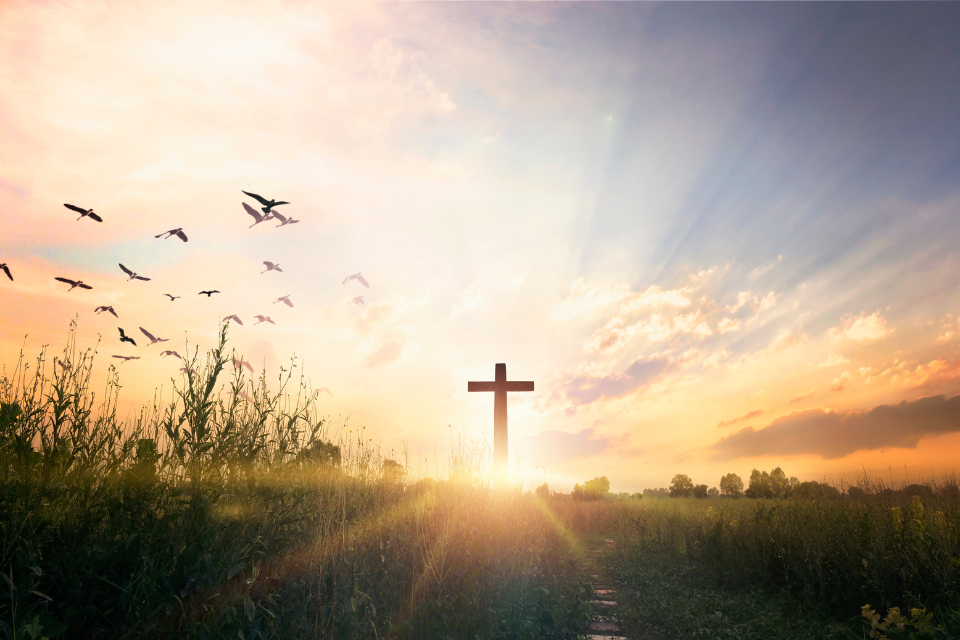Bishop David Alan Bard’s Easter message asks us to hold the pain and honesty of Good Friday together with the hope and wonder of Easter.
BISHOP DAVID ALAN BARD
Michigan Conference
Many of you know I enjoy music, and for Lent 2021, I engaged in a unique discipline by putting together a playlist, a song each day from Ash Wednesday through Easter. I chose songs from my own music collection. The selection was both thoughtful and impressionistic. I chose songs thinking of their themes or what they evoked, yet I chose them as they came to mind. The choice of one song, however, was a given.
For those of us alive during that time, we will never forget the shock, pain, and tragedy of September 11, 2001. Planes were flown into the World Trade Center and the Pentagon. The massive towers of the World Trade Center collapsed, killing thousands and scattering debris throughout Lower Manhattan.
Following that tragedy, American composer John Adams was commissioned to write a piece of music. The result was “On the Transmigration of Souls.” The composition was awarded the Pulitzer Prize for Music in 2003, and the premiere recording with the New York Philharmonic received the 2005 Grammy for Best Classical Album.
Ever since I first heard this evocative and haunting piece of music, I have listened to it every Good Friday, and it was part of my 2021 Lenten discipline. I listen to it on Good Friday, the day we recall the death of Jesus, because, in the Christian faith, the death of Jesus is more than the brutal, violent death of a person. It signifies and symbolizes more.
“For the Son of Man came not to be served but to serve, and to give his life as a ransom for many” (Mark 10:45, NRSV). “That is, in Christ God was reconciling the world to himself, not counting their trespasses against them, and entrusting the message of reconciliation to us” (2 Corinthians 5:19). “He himself bore our sins in his body on the cross, so that, free from sins, we might live for righteousness; by his wounds you have been healed” (1 Peter 2:24).
Throughout Christian history, the precise meaning of the death of Jesus has been debated, but there is common agreement that something about his death heals, frees, and redeems. More fully, we are healed, freed, and redeemed through the death and resurrection of Jesus.
But let me stay with Good Friday and “On the Transmigration of Souls” a bit longer. Jesus’ death was painful and brutal. Crucifixion was a particularly cruel way to take a life. Death often took a long time, and the crucified person suffocated while hanging on a cross. The Roman authorities used this form of public execution as a means to maintain order.
This death of Jesus, then, symbolizes injustice and cruelty. One can symbolically pour into this death all the destructiveness, violence, and tragedy in our world—planes flying into buildings, innocent children being shot and killed at school, wars of aggression, and willful human blindness to suffering.
When we are honest with ourselves, we know that we have caused harm, we have failed to do the good we can do, and we have been cruel or callous. The cross—Good Friday—invites me, and it invites us all, to look at the worst humans can do. It asks us to look realistically at our world and see where there is damage, cruelty, and indifference. Listening to “On the Transmigration of Souls” helps me do that.
Yet, three days later, we celebrate Easter, the holiest and most significant day in the Christian year. We celebrate that God raised Jesus from the dead, and sing, “Christ the Lord is risen today, Alleluia!” If you are wondering, the song on my playlist for that day is “Easter Song” by the early Christian rock group 2nd Chapter of Acts. It is a day for joy and celebration, a day to pay attention to wonder, beauty, mystery, kindness, and love.
What I think is vitally important is that we hold Good Friday and Easter together. To know the full joy of Easter is to understand the horrific events of Good Friday. Good Friday invites us to look honestly at injustice, cruelty, indifference, callousness, and the world’s brokenness. That Jesus is crucified reminds us that God takes all that in. We cannot hide our brokenness and the world’s brokenness from God, like Adam and Eve in the garden trying to hide from God behind a tree. God sees, knows, and takes in our world—and then, there’s resurrection! No matter the cruelty, callousness, injustice, indifference, pain, or damage, God is not done with us, and God’s grace and love will rise up to heal, free, and redeem.
Because God raised Jesus, we know forgiveness and new beginnings. Because God raised Jesus, we live more lovingly, trusting that love will win. Because God raised Jesus, we live courageously toward a newer world and a more just and beloved community, trusting that someday it will be so. Yes, we see the discouragement in Good Friday and end up hopeful with Easter. We see ugliness and cruelty and then end up with wonder, beauty, and mystery.
Friends, these are difficult days—an ongoing war in Ukraine, heartbreaking gun violence, persistent hunger and poverty, destructive weather, and denominational dissension. We often feel Good Friday, for it is all too real. So, I invite us to feel, know, and experience Easter deeply and profoundly. Know it, feel it, and experience it in the deepest parts of your hearts, minds, and souls so as to live as God’s Easter people. May it be so for each of you.
Last Updated on April 18, 2023

